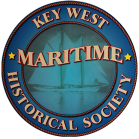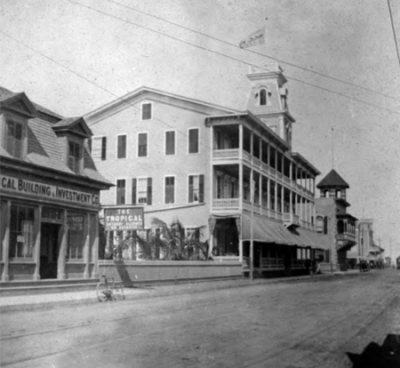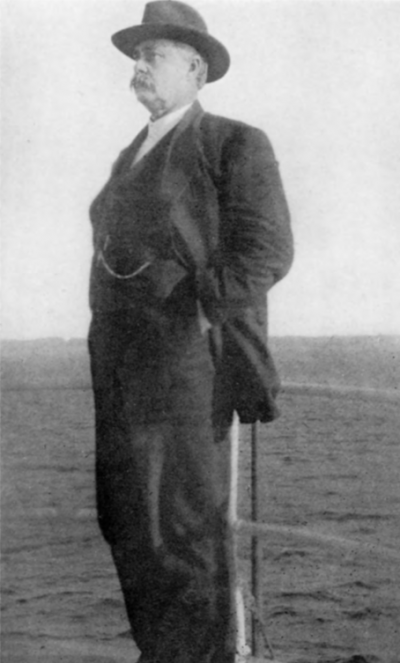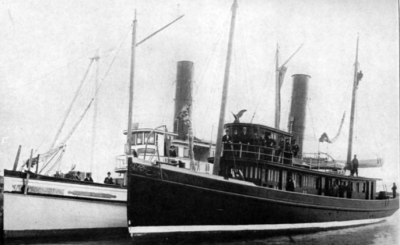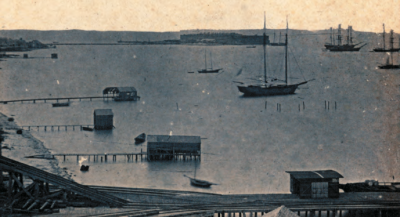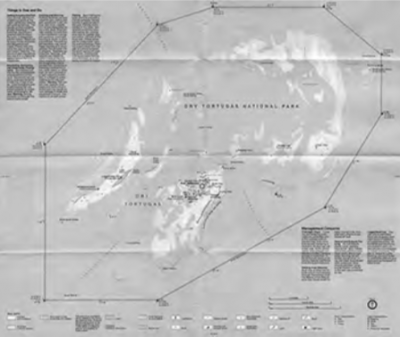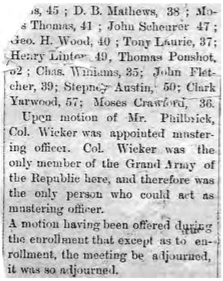Dope Den on Duval Street.
Following letters are from the Scott De Wolfe collection and were transcribed by Mary Haffenreffer. They include letters from Mrs. Gray L. O’Brien, also known as Mrs. W.D. Cantrell, writing to her husband in jail in Dade County in June 1921. One or more of the letters containing morphine were confiscated by law enforcement Mrs. O’Brien appears to have been a player in a major drug operation in Key West. The article includes correspondences when the letters were confiscated by federal officials who forwarded them to the appropriate agency for investigation. Local law enforcement agencies were not included in any of the correspondences because the lack of trust.
As often happens in history research, the whole story could not be found. A search of local records and of Miami newspapers failed to find any reference to this incident.
DEPARTMENT OF JUSTICE Bureau of Investigation Miami, Fla.
June 4, 1921
Howard P. Wright, Esq., Box 32, Jacksonville, Fla.
Special Agent in Charge
Dear Sir:
Enclosed are letters which were intercepted this date by Deputy Marshall Moritz. They were written by Mrs. Gray L. O’Brien to her husband, who is now in the county jail serving time on a possession of dope charge. His time will be up in a few days, and there is now a check here to pay his fine. I have asked Moritz to delay collecting the fine until day after tomorrow.
As the thick letter indicates, Mrs. O’Brien is on the inside of a dope ring at Key West. The Manuel A. DeCastro is the Cuban who was caught here some time ago with a large quantity of morphine, and who was recently sentenced (very lightly). The Murphy mentioned is Joe Krause, who was also recently released from jail on a liquor charge. There is little doubt that Krause and DeCastro are in Cuba to get a load of dope.
You will also note the “one big block,” this being a large block of morphine crushed. This was sent through the mails. The reference to “Garcia at the Victoria” means one of the Cuban waiters at the Victoria Restaurant in Key West. This man is a dope seller.
The O’Briens ran a dope den here all winter, and the arrest of O’Brien caused him to become acquainted with Krause and DeCastro, while all were in jail. The police recently closed the house, and ordered Krause and Mrs. O’Brien out of town. The Mitch mentioned is a Miami dope runner who has never been caught.
Kindly refer this matter to a narcotic inspector, and impress upon them the fact that they must take immediate action if they wish to catch DeCastro and Krause. I suppose there will be no trouble catching Mrs. O’Brien. She is stopping at The Jefferson Hotel in Key West under the name of Mrs. W. D. Cantrell.
You might warn the narcotic people not to go near the Federal Building, particularly the Customs. If possible they should not travel on a ticket indicating “govt. request” as they will be tipped off by the railway conductor.
Department of Justice Bureau of Investigation Miami, Fla.
June 8, 1921
Howard P. Wright, Esq., Box 32, Jacksonville, Fla.
Dear Sir:
Gray L. O’Brien and wife alias Mrs. W. D. Cantrell
Enclosed herewith are more letters in one of which is some morphine, and in another, a reference to sending the morphine.
Enclosed also is a note to Dr. L. H. Martin, signed by B. C. Taylor, a prisoner in the county jail. This note was taken from the lining of the clothing of O’Brien when he was released from the County Jail this morning on payment of a fine by his wife.
Kindly refer these matters to the nearest narcotic inspector.
Respectfully,
Leon E. Howe Special Agent
TREASURY DEPARTMENT Internal Revenue Service Atlanta, Ga.
Jacksonville, Fla.
Office of
SUPERVISING FEDERAL PROHIBITION AGENT
GULF DEPARTMENT June 9, 1921
Hon. D. J. Garett S. F. P. Agent Atlanta, Ga.
Sir:
I am sending some correspondence turned over to me today by Special Agent D. of J. No doubt there is something to it but Key West is a hard place to get results.
Respects,
W. J. Maloy Narcotics Inspector
TREASURY DEPARTMENT Internal Revenue Service Atlanta, Ga.
June 10, 1921
Office of Supervising Federal Prohibition Agent
Gulf Department HGJ.
Mr. C. E. Miller Narcotic Inspector Atlanta, Ga.
Sir:
Enclosed you will find information transmitted to this office by Narcotic Inspector W. J. Maloy.
In course of your investigations in Florida please give this due attention.
Respectfully,
W. J. Drautzburg (signed) Head, Narcotic Unit, Narcotic Division
Gulf Department.
DEPARTMENT OF JUSTICE Bureau of Investigation
407 – 9 – 11 Bisbee Building
Jacksonville, Fla. June 14, 1921
Respectfully,
Leon E. Howe (signed) Special Agent
D. J. Ganett, Esq.
Supervising Federal Prohibition Agent,
Federal Building, Atlanta, Ga. Dear Sir:
Re: GRAY L. O’BRIEN AND MRS. W. D. CANTRELL, Narcotic Matter.
I am enclosing you copy of letter from Special Agent Howe, of this office, dated June 8th, attached to which are several letters from Mrs. W. D. Cantrell, Key West, Fla., addressed to G. L. O’Brien, General Delivery, Miami, Fla. It will be noted that one of these letters contains several grains of powered morphine sent through the mail.
Several similar letters containing morphine were turned over to Dr. Maloy, Narcotic Agent, by me, several days ago, but I have been unable to get in touch with Dr. Maloy since that time and am therefore sending these letters direct to you.
Yours very truly,
Howard P. Wright (signed) Special Agent in Charge
HPW:B encl.
TREASURY DEPARTMENT Internal Revenue Service Atlanta, Ga.
June 15, 1921
C.E. Miller Esq., Narcotic Agent, Jacksonville, Florida
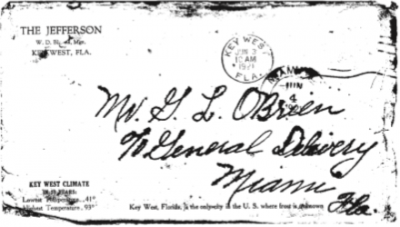
An envelope from the Jefferson Hotel used by Mrs. W.D. Cantrell. Photo credit: Monroe County Library.
Sir:
I am enclosing you herewith some correspondence which is self- explanatory.
Give the same such attention as you think it deserves.
just count the days until I can see my Daddy. Dear, I love you more and more each day. I am sick. Came so Friday and of course can’t make any money for a day or so but will send you some tomorrow. Am sending you the receipt for the Lights. You can notify them to take the meter out and get five dollars on that. If you need anything just let your Baby know and she will see that you get it at once. I just think of you all of the time and dream about at night. Do you ever think of your Poor Little Baby way down here by herself with no one to love her or look after her at all? I do miss My Daddy so awful much. I want you to promise me that when you get out of there you will come to me on the first train that runs this way. Won’t you do that for me? Write and tell me that you will tell me exactly the day you expect to get out so I can look for you. Well, I am going out to supper and OH! How I wish you were here to go with me but you will be before very long, won’t you Dear? I will write again tomorrow and send those things to you. Answer at once and tell me how much you Love Your Baby.
With all my Love The Jefferson
D. J. Garrett
Supervising Federal Prohibition Agent.
The Jefferson
Key West, FLA. 29th
My Own Dear Daddy,
Have not heard from you as yet
but hope I will do so by tomorrow. How is my Daddy feeling? I do hope you are well. Don’t you now that little Old Jew is down here. Followed me right on down here. I jumped on him about that other and he denied everything of course but I am not going to trust him anymore. Am having lots of trouble getting The Stuff but will have it for sure tomorrow. Lopez has been getting me just a little bit every [?] from a Dr. They have to wait for the boat from Cuba. As soon as I get it I will send you some. Will also send some “C” so as my Daddy can enjoy himself a little bit. Anyways, I want to see you so awful bad I don’t know what to do. I get so lonesome and blue I nearly die. I
(signed)
Key West, FLA.
Dear Daddy,
What is the matter? Have not heard from you since Friday and I have written every day and sent two wires. I was sure I would hear today but did not. Please write me and let me know what is wrong. Am wiring you ten dollars today for railroad fare. Be sure and get the money from the Gas and Lights. Let me know if you need anything at once. Am also sending something else in another letter. Please write me at once and let me know when you are coming. Come just as soon as you get out on the first train that runs for I do not want to see you so awful bad and I love you so good so please come to me as soon as you can and I will see that you get everything that you want. Write at once.
Always yours, Baby
The Jefferson
Key West, FLA.
My Own Dear Daddy,
Oh! Daddy how could you write
to your Baby like you did? It almost broke my heart when I read your letter yesterday. It is hard enough for me to have to be away from you and then to think that you doubt me like that. You know I have always been true and square to you and it sure does hurt me for you to talk that way for you know you are all I have left – to have me and if you go back on me I will just kill myself for I love you better than my life and I can’t live without you. I will tell you why Joe told you that. He asked me to stay with him and I refused and he got mad so now he is trying to put you against me. I wrote you that Murphy was here but I will swear I never went with him at all. He and Manuel left Sunday for Cuba to stay. He was only here two days. Dear, I swear I never spoke to
him at the train the day I left. I was with Mitch and Mitch gave me $5.00 but no one else gave me one penny. See Mitch and ask him all about it if you can’t believe me. Do you want to take a perfect stranger’s word to your own Baby’s word? It sure does nearly kill me for you to treat me that you and I have always stuck to you through everything and always tried to treat you right and done all I could for you and always will as long as you will let me. Please, Daddy, don’t go back on your Baby, if you do it will just kill me for I have given up everything I hold dear in this world for you but I don’t regret it one bit – only wish I had more to give. I would even give my life if it would help you in any way. You know I would. Please, Dear, if you have any love at all left for me, for God Sakes, don’t write me like that anymore. I am almost crazy now and I am so sick I cried all night long. Thinking about you, is there any one person in this world that has as much trouble? I guess the Lord is punishing me as you said he would but it is almost too much for me to stand. I have not been able to make any money, have been sick since Friday, have my hotel bill to pay and there is no Stuff in town. I have been getting just a few little pieces at a time from Dr. They are expecting some in every day from Cuba so I have been suffering and worrying for that. Don’t know where the next Shot is coming from. You know how it is – what you take don’t do any good but I will be fixed tonight and can get all I need of both and it won’t cost me anything, not one cent. I have only one real friend here and that is Garcia at the Victoria. He will get in a supply and as long as I treat him nice he will give me all I can use for myself and you and he sells me the 25 gram boxes for $25.00 per box so we ought to make some money with it when you come down here. He sure has been nice to me. Gives me all my meals and he have me an awful pretty hat yesterday. Bought it and sent it to me but it looks fine on your Baby and we are going to get me a dress today. I look like a tramp now but you won’t know your Baby when you see her. I am ashamed to go on the streets. I make him think I am sick so he sends me my meals to my room and is so nice to me. When I get fixed up I can make some good money here in the hotel. Listen, Love, Big A’s place has closed up on account of her Daughter dying and they locked her up for killing her daughter. She took too much of “M” and “C” mixed. Don’t know what they will do with her. They got all of her girls, too. Most of them use it, too, and they took all she had that is why it is so scarce here now. Well I know you are tired of reading this but it is just pouring down rain outside and I am so lonesome and blue for you. Listen, Dear, I want you to see Mitch and ask him about that and you and also send your friend down here and ask anyone you want to about me and I am sure you will find out I am not lying to you and am willing to do anything you want me to. All you have to do is just say so. Now, Dear, I want you to write me at once and tell me you are not mad with your Baby and you Love me a little bit. I have written you every day since I came. Don’t know why you don’t get them. Will send you $5.00 in another letter along with this. One it is all I have. Will send more tomorrow with something else.
With all my love, from your own,
Baby
Filibusters in the Keys
By John Viele
It is midnight, Christmas Eve, 1896, as a large unlit ocean-going tug cautiously feels her way towards a low-lying Key and drops anchor. Crewmen lower several boats and load them with case after case of rifles, ammunition, explosives, and machetes. Spanish speaking men climb down into the boats and clumsily row and then drag the boats across a mile of shallow water to the island. The boats move steadily back and forth between the tug and the shore through the night and into the morning. Finally at noon, as the last boat departs, the tug weighs anchor and runs rapidly out to open water. Left on shore, collapsed among the mangroves, are forty-five exhausted men oblivious to their surroundings.
The men and cases of arms and ammunition had landed on No Name Key, just east of Big Pine Key. They were a group of forty Cuban patriots and five Americans, two of them reporters for major newspapers, on an expedition to help free Cuba from the yoke of Spain. A Cuban revolution had begun in 1895 and was still ongoing at the start of the Spanish-American War in 1898.
Soon after the start of the Cuban revolution, President Cleveland declared the U.S. would remain neutral and instructed collectors of customs and the Revenue Marine (forerunner of the U.S. Coast Guard) to be on guard to prevent armed expeditions bound for Cuba from leaving U.S. ports. These illegal attempts to support the Cuban rebels were known as filibuster expeditions.
Despite the President’s proclamation, many Americans were sympathetic to the Cuban rebels’ cause. While a few joined the fighting in Cuba, others, motivated in part by financial gain, took risks to ferry Cuban patriots and arms from the U.S. to Cuba. In cities with large Cuban populations like Key West, Jacksonville, and New York, Cubans formed clubs to raise money to support the revolution, particularly to provide money to outfit and finance filibuster expeditions. In the annals of filibustering, two men and two vessels stand out above the rest. They were Napoleon Bonaparte Broward, who later became governor of Florida, and the tug Three Friends, and captain “Dynamite” Johnny O’Brien and the tug Dauntless.
While most of the filibuster runs made by these two captains originated in Jacksonville and other north Florida ports, the Keys played an important role in their operations as rendezvous harbors, escape havens„ and arms caches. On his first filibuster run, Broward raced the Three Friends out of the St. Johns River under cover of darkness to escape a revenue cutter on the lookout for him. At Indian Key, he rendezvoused with two schooners carrying arms, ammunition, and sixty-five Cuban patriot volunteer fighters. By previous arrangement, a Cuban pilot was taken aboard to guide the tug to the planned landing place. After almost causing the tug to run aground, he piloted the tug into a bay and announced it was the proper place. But Broward sighted a small fort and a village on the shore not too far distant. He conferred with the Cuban general as to whether to proceed with the landing. The
general finally decided to go ahead. As the general’s boat hit the beach, the fort opened fire on the landing party and on Three Friends. When Broward’s crewmen refused to row any more fighters to shore, Broward said he would do it himself. With that, some of his leading crewmen said they would take the chance. Then Broward sighted a Spanish gunboat approaching at high speed. He ordered a deck hand to cut the anchor line and, as soon as the returning boats hooked on to the davit falls, got underway. The gunboat commenced firing. Seeing no way to escape, Broward told his crew he intended to ram the gunboat and all hands should prepare to swim ashore. Just at that moment, he remembered the big pine-wood knots piled on deck. He called to his men to throw the pine knots in the boiler furnace. A huge dark cloud of smoke belched from the tug’s stack. Concealed by the smokescreen, the Three Friends escaped.
On a subsequent run, Broward was scheduled to meet the paddlewheel steamer City of Key West carrying 449 cases of arms off Alligator Light. But before the rendezvous could be effected, a revenue cutter surprised the two vessels and ordered them into Key West to be searched. The more- than-tolerant Key West inspectors found several cases of arms on board Three Friends, but decided there was not enough to constitute an “armed expedition.” and she was released. Because the City of Key West was not suspected of being involved in filibuster operations, she was also let go.
Undaunted by his narrow escape, Broward immediately proceeded to an unnamed key, probably Bahia Honda, loaded forty-five Cuban volunteers, plus a large store of arms and ammunition, and successfully landed them in Cuba. As the Three Friends neared Key West on her return, she was sighted and chased by the US Navy cruiser USS Raleigh. Moving through a shallow passage in the reef where the cruiser could not follow, Three Friends once again escaped. According to one source, spectators on rooftops in Key West cheered
The successful runs of Three Friends, Dauntless and other filibuster vessels were no secret. In fact, Broward was given a public hero’s welcome in Jacksonville when he returned from his second expedition. In the face of this, President Cleveland issued a second, sterner anti-filibuster order. He ordered more revenue cutters and two Navy cruisers to patrol Keys waters. Pinkerton and Treasury detectives followed the filibuster captains. More detectives, hired by the Spanish government trailed the senior Cuban military officers. General Weyler, commander of the Spanish forces in Cuba, offered a $25,000 reward for the capture of any filibuster captain, dead or alive.
With the risks becoming greater, the Cuban revolutionary groups were having trouble recruiting vessels and captains. The answer to their prayers came in the form of a daring Irish seaman, “Dynamite” Johnny O’Brien, and a tug with the reputation of being the fastest in the south, the Dauntless.
By early fall of 1896, O’Brien had made five successful landings in Cuba and earned enough money to recoup the cost of the tug. To avoid arousing suspicion, O’Brien and Cuban liaison officers would debark the tug on the return voyages and row ashore to Key West. Despite these precautions, a revenue cutter
seized the Dauntless on her return from Cuba in September.
With Dauntless temporarily out of action and Broward under close watch, O’Brien was assigned to take Three Friends on the next run. In addition to forty Cuban
patriots, there were three Americans on board. Two were newspaper reporters, Ralph Paine and Ernest McCready, the third was an ex-U.S. Navy gunner’s mate. Mike Walsh.
While navigating the tug’s way into the mouth of the San Juan River for a night landing, O’Brien saw the dim image of a Spanish gunboat waiting for him. He immediately reversed course and rang up full speed. Because her boilers were fouled with grease and salt, the tug could not make her top speed and the gunboat drew slowly closer. As the tug exited the bay, O’Brien saw two more gunboats, one to the east and one to the west, closing on him. It was apparent that the expedition’s plans had been leaked to the enemy. When the first gunboat was about a half mile astern of the tug, she opened fire with her one-pounder guns. Fortunately for Three Friends, the Spanish gunners were poor marksmen.
O’Brien ordered the Hotchkiss twelve-pounder field gun to be broken out of its packing case. Navy gunner Mike Walsh, seeing the gun, shouted up to O’Brien “If you’ll let me handle it, I’ll guarantee to produce a whole lot of Spanish stomachache with its pills.” Because the after deck was crowded with the small boats, the gun could not be located there. Mike, assisted by Ralph Paine and an engine crewman, set the gun up on the forward deck next to the deck house. He shouted to the pilot house, “Ready to fire!” and to the Spanish gunboat, now less than a half mile astern, “Prepare for burials at sea!” O’Brien swung the tug so the gun would bear. Expecting to hear the report of the gun firing, all he heard was curses from the gun crew. Walsh fixed the problem and reported he was ready again. On the second attempt, the gun fired and the shell hit the Spaniard’s forward deck house and exploded, completely destroying the deck house and the pilot house. The stricken gunboat
drifted to a stop and hoisted a red lantern to signal that she was out action and needed help. The other two gunboats abandoned the chase to come to her aid. In the only naval engagement of filibustering, Mike Walsh’s shot had saved the members of the expedition from almost certain capture and execution.
O’Brien could not afford to reenter a US port with the arms and rebels on board, so he decided to deposit them temporarily in the Keys. This was the Christmas eve landing on No Name Key. After leaving No Name, O’Brien left Three Friends and made his way to Key West aboard a chartered sponge schooner. He told the Cuban club about the men and munitions he had left on No Name and then took passage to Tampa aboard a passenger steamer.
During the landing on No Name, one of the small boats had been blown off its course by the rising morning wind. Mike Walsh was in the boat. As he swore at his floundering crew of four Cuban landlubbers, the boat drifted out of sight into Hawk Channel. Powerless to aid Mike, the men on the beach gave the boat up for lost. But at noon the next day, much to everyone’s surprise, a small boat, with a tiny patch of cloth bellying out from an upright oar, sailed slowly into the beach. Taking advantage of a favorable shift in the wind, the indefatigable Mike Walsh had jury rigged his shirt as a sail. Mike roared “I’ve been to the coast of Africy and back with a crew that made me weep continuous. An’ me only shirt is blown out of the bolt ropes for I couldn’t stop to reef it after I got it set.”
During the next four days, a heavy norther blew, and the party’s food and water were almost exhausted. When the weather calmed, Mike
Walsh and several others rowed to Big Pine Key and returned with some water and bananas.
The next day, a schooner, dispatched by the Cuban revolutionary club in Key West, arrived with food and water. Ralph Paine, the adventuresome newspaper correspondent, and his reporter friend decided to go to Key West and hired the schooner to try to find out what was going to happen to the expedition next. After contacting members of the Cuban revolutionary club, they were able to wire their stories of the engagement with the Spanish gunboat to their newspapers.
Later at the Cuban club, Paine learned that the stories of the Three Friends engagement with the Spanish gunboat had been widely publicized. When the tug stopped to replenish her coal supply in Key West she was seized by customs officials. Later that day came the intelligence that O’Brien had reached Jacksonville and managed to sneak aboard the Dauntless. At night in a fog, he got her underway, and escaped the revenue cutter watch. He was, at that moment, onhiswaytoNoNameKeyto rescue the expedition. Paine and his companion decided they had better get back to No Name in a hurry. Paine managed to persuade the skipper of a fast steam yacht, the Vamoose, under charter to his newspaper, to take them back to No Name Key.
A fleet of ten local sailing craft had been hired to expedite taking the Cuban expedition personnel and arms back aboard Dauntless when she arrived. The operation was in full swing when Vamoose appeared over the horizon headed for the scene at full speed. Thinking they had been discovered by a revenue cutter, the skippers of the sail
boats turned and ran for the narrow channels between the Keys. At the urging of the skipper, the black gang on Dauntless began stoking the boiler fires furiously.
Before Dauntless could slip her cable, Vamoose was close enough to be recognized as a yacht and not a revenue cutter. While Ralph Paine received a torrent of oaths from a Cuban general for upsetting the loading operations, the sailing craft were recalled. It was late afternoon before all the arms and men were aboard Dauntless. Three days later, O’Brien landed them successfully in Cuba
Dauntless made four more runs to Cuba in 1887 and one more in 1898. During the course of these operations, O’Brien once again played hide and seek in the Keys with the Navy’s blockading forces which had been increased
to one battleship, six cruisers, five gunboats, and six revenue cutters. On two occasions, one because of a boiler explosion on Dauntless, she was intercepted and brought into Key West and charged with violation of neutrality orders. In both cases because of insufficient incriminating evidence or testimony and the pro-Cuban-revolution sympathies of local officials and jurors, she was released.
Returning from her last run in February 1898, Dauntless paused briefly at Bahia Honda to drop off O’Brien and several Cuban officers. With the help of local spongers and fishermen and Cuban leaders in Key West, O’Brien was able to arrange for the passenger sidewheeler City of Key West to divert from her regular run to Biscayne Bay to pick up his party. When they were on board, they received their first
news of the sinking of the Maine in Havana harbor and realized that their adventure-filled filibustering days were coming to an end.
SOURCES
London 1912.
Paine, Ralph D. Roads of
Adventure. Houghton Mifflin Co., 1925
Proctor, Samuel. Napoleon Bonaparte Broward: Florida’s Fighting Democrat. University Press of Florida, 1950.
John Viele is a retired naval officer, former submarine commanding officer, author of a three-volume history of the Florida Keys, where he now resides.
Sergeant Calvin Shedd at Fort Jefferson
Calvin Shedd was a carpenter turned soldier from Enfield, New Hampshire who served in the Union Army from 1861-63. As a first sergeant and later a second lieutenant with the 7th New Hampshire Volunteer Regiment, Shedd witnessed first-hand the hardships of a soldier’s life at Fort Jefferson during the Civil War. Arriving in the Tortugas in March, 1862, Shedd’s unit departed less than four months later. During that time, Shedd and his fellow New Englanders experienced unbearable heat, mosquitoes, sickness, boredom, poor food, overcrowding, and death from disease. The following letters were written by Shedd to his wife, S. Augusta Shedd, and three daughters living in New Hampshire. These letters begin when he left New York for Fort Jefferson. (This transcript makes changes in Shedd’s punctuation and spelling to improve the readability without changing the meaning). Upon leaving Florida, the 7th New Hampshire Volunteers were sent to the coast of South Carolina. The regiment, however, was plagued with ill health and was ordered to St. Augustine to recuperate. Over the next months, Shedd suffered from chronic dysentery and spent much of his time in the general hospital in Hilton Head. Unable to rejoin his unit and pronounced unfit for active duty, Calvin Shedd was formally discharged from service on December 31, 1863.
Fort Jefferson, May 25, 1862. My Dear Wife Augusta,
I am most happy to have the time to acknowledge receipt of a letter from you, Ada & Annah of May 11th, for which I thank you
heartily. I was on guard and it helps me to keep awake; as I looked on the stars. I thought perhaps you might be looking at the same & it was a happiness to me to think that we were looking at the same & it seemed to be a bond of sympathy and love. I am in good health and spirits but on “Police” & we have to load gun carriages this p.m. I have no time towriteonlyfrom12to1&eatmy dinner out of that so you must excuse me as the mail goes out at 5 p.m. and I shall not be off duty till that hour. I am very sorry to hear that Johnson isnomoreforhewasamanofgood heart. I liked him. Peace to his ashes. One o’clock is now beating. I will try to write some more if I can run away from duty a few minutes this p.m.
May 28th. I thought I should get time to finish this the other day but, could not get a minute. I was quite sick yesterday. I hurt my back lifting gun carriages and took some cold. I feel better today. We have had spring showers here for a day or two. It will rain vary fast for a few minutes, then the sun comes out hot again. I don’t know what to write: there is no news going. There has several vessels arrived within a few days: a gun boat yesterday, the Wanderer, of Slave Trade notoriety, but none of them with any news. There has been nearly 200 men detailed for several days to unload a cargo of coal & of shot & shell. The vessel that brought the shot & shell has 80 men of Michigan and Vermont Regiments that were left behind sick and now go to Ship Island. They left this morning. I feel very weak and nervous. I can hardly write it is so warm and muggy. I have no energy. I shall be better in a day or two. P.M. I have just come in from drill the sweat is running down in streams. It does not seem much warmer than it is frequently
at home, but we sweat three time as much. I hope Cummings will do what is right by you but I expect he will come up with some money. He is a slippery fellow on a trade. Lieutenant Williams thinks he will start for home soon as he thinks his papers will be signed this time as he got Dr. Brown to endorse them. Don’t speak of that, however, as perhaps he would not like to have it known. He tells me things he don’t tell everybody. There are no signs of pay day yet. I am afraid we shall get none until July, although there are stories that it is coming every week. Dodge has got a 24 pound ball attached to his ankle with a chain stout enough for a horse to draw by; he has got to wear it two months. He looks rather sober over it. Sam is pretty well – a little lame at times. Burrell is well, sends his love to his little girl and friends. All of my boys are well as usual & the best squad in the Company. They have gained some on the Fort: since we came they are now building the magazines on the parapet. Bricks arrive here in large quantities: they cost the Government $17.00 per M & come from Maine. They have got the new condenser at work and it makes much better water than we have had heretofore, it is very clear and tastes much better than that made by the old one. It is near supper time; we eat at 5 & then get ready for dress parade at 6. I want to see you all very much but it is of no use longing but must wait the course of events.
My Best Love to you all,
C. Shedd,
4th Sergt.
Co C 7th Regt NH Vol. That is a handle for a name.
Fort Jefferson
June 9th, 62, 3 PM.
Dear Wife,
I hear that a mail leaves here this eve. I have nothing to write but will send you a line, if it is not quite so bright. I am pretty well – in fact quite as well as one could expect in this climate. It is tremendous hot here today. Two men died yesterday one was sick only 13 hours, the other had been sick before in the hospital & was discharged from it a day or two ago. His orderly put him on fatigue; he said he was sick & not able. The orderly told him he was notsick&ifhedidnotgotowork he would put him on guard. He went to work a little while, then went to the hospital & died in a few hours. The lives of many of us will lay at the doors of some of the officers, the curses of the men against them are loud & deep. The inspector did not leave Saturday as we expected. This morning Company C was paraded to show him our dexterity
on heavy artillery. We fired 10 shells that cost Uncle Sam $100.00. I had command of Gun No 8, an old Chambered Columbiade. She made the best shot. Corporal Chase was my gunner, the battery under command of Captain Langdon of the regulars. We commenced drilling going through the motions of loading & firing. We had been loading by detail & was ordered to load for action, i.e., to go through the motions without direct commands for every motion. I was instructing numbers 1 & 3 in relation to their duties when my gunner ordered the men to load with cartridge & shell. I did not find it out till I heard the shell grating inside the gun as they were ramming it down. You had better believe I swore, as it was my duty to cut the fuse & prepare the shell. There it was the shell in the gun without any fuse & if fired in that condition, liable to burst in the gun – to burst the gun & knock us all into a Cocked Hat. There stood the colonel & inspector not 10 feet from
the gun. I could have cut Chase’s heart out with a good relish. Captain Langdon ordered my detachment away from the piece. I marched them away & broke rank, feeling ashamed enough; but they could not get along without me. House came to me to take command of number 8 & turned out Sergeant Noyes. I made the best shot after all the fuss; then I felt some better. There was no damage done for we drew the shell & cartridge and it was all right. I have had no papers for the last three mails: don’t send only the latest ones up to the time of writing. There is no signs of a paymaster yet. I begin to think we shall not get any pay till the middle of July, which shall be six months. A rather long time to wait but I suppose it is sure to come sometime. Burrell could not stand it in the kitchen but a week. I don’t see how Ned stands it so well, he is tough. Tonight we have got to go to dress parade. Earlier tonight to show the Inspector our skill in firing
blank cartridges in a sham fight. If we are reported to General Hunter favorable, I presume we shall have to take the field this fall & leave our bones to bleach in the sun of Dixie: well, let her rip. It is appointed once to die, then cometh the Judgment, then we shall see what we shall see and I am of the opinion that many will be disappointed if there is a Hell. I expect to go to it & I don’t believe it is much hotter than Tortugas and if is I should rather keep away. Keep up good courage, be as happy as you can, don’t let anything in the future trouble you any more than possible.
I close with my love to you all, C. Shedd.
Fort Jefferson June 1st, 62. Dear Wife & Children,
It is Sunday morning we have just come in from inspection & it is very hot. The boys were streaming with sweat. I am better than when I wrote last. There the Colonel & staff has just passed through the quarters. The wind tipped over my ink bottle & spilled the whole on my rubber blanket which I use for a tablecloth. I don’t know as I can write much as each day is about a pattern of the next – all nearly alike & no news except a rumor that North Carolina has returned to the Union. If true you will have known it for a long time. It is uncertain when a mail will leave here; we expect one the middle of the week. Williams is as tickled as a boy at the prospect of going home. It will take him down a peg if he is disappointed this time. The Regiment is in better health than at any time since we arrived. A good many have the rheumatism, some have the sore throat. House has done some almighty mean tricks to which it will not answer to record. I will fix them sooner or later if I live.
3d. It is cooler the wind blowing quite hard & partially cloudy. I should like to have you heard the boys swear yesterday p.m. when we came in from company drill. I never saw such a numb head as House: it was one continued blunder all through the drill. At one time he had the company wrong end, too: inside out & he was on the wrong side of the company himself, the company was perfectly disgusted & ashamed with & of him & of the appearance they made on the parade ground. The company will show him up if they ever get home. Well it is no use talking. The Colonel swears at the officers on drill night. I should think they would feel ashamed. He yelled out to them the other day what in H- -l are you about. You don’t know as much as your men do. That suited the boys. He sung out at House the other day: “Damnation, what are you doing there?” They give wrong orders & snarl the men all up & can’t seem to learn. Appear frightened as a parcel of whipped boys when their daddy is around.
5th. I remember yesterday & today as the birthdays of our children. I have thought of you all many times. Yesterday I went to West Key after shells, I got about a pint of all kinds. I shall try to send them by Williams, if he ever goes home. You don’t know how hot it was on that barren sand yesterday: it seemed as if the sun would burn into ones brain. I don’t wear anything but my old fatigue cap. Many have got thin hats but I am going to be a Soldier while I am in the Army. I wear nothing but Army clothes except stockings. At noon the sun is exactly in the Zenith: a pole placed on end perpendicular casts no shadow. It is rather odd to see the sun shining on all sides of the Lighthouse equally. It is sweat- sweat day & night. No mail yet; we expect one every day as soon as we receive it there will be one leave so I write along from day to day. I think it is about the best thing you can do to let Mr. Pillsby have the pasture as you propose. Last night 7 of our boys went to Loggerhead & got two turtles as big over as tables. One laid 134 eggs after they turned her over. This morning they butchered the other & took out 130 eggs, beside a half pail full of little eggs without shells each turtle has 3 sizes in them: one batch with shells ready to lay, the others look like yolks of hens’ eggs: they cannot be boiled so that the whites will be hard as other eggs but have to be fried or poached.
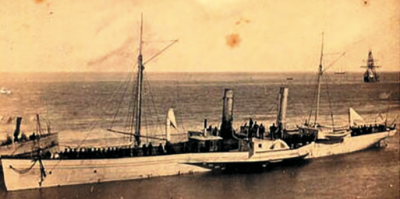
A ship captured running the blockade in Key West during the Civil War. Photo credit: Monroe County Library.
June 6th. Yesterday p.m. we are very happy in receiving a mail yours of the 18th of May. I was very glad to hear that you were all well. I did not think Ada would get promoted so soon. I think she is pretty smart – don’t let her study to hard. Annah must not be jealous of her, for I hope she will get in with her when she is as old. The Inspector General of this Department arrived with the mail & at 8 this morning we had to go out with knapsacks packed & be inspected. We had a shower this morning so that it was quite comfortable for this place. We have an advantage in being the 2d company that is inspected and get in sooner than the other 8 companies. I should have liked to have seen Cambridge in the pond better than any other man I know of. We hear that there has been a requisition on Governor Berry for another regiment & the President is going to call out 100,000 more men. If that is the case you will not see us at home at present if ever; for if we have to go to the mainland & go through with one or two campaigns. Many of us will be under the sod within a year. So prepare for the worst & hope for the best is my motto. Williams has got no backbone more than an eel: that is the greatest objection the men have to him. It looks as if the government thought the war was not very near its close if this above rumor is true. We are going to have turtle soup for dinner today, if we could have things to season & put with it probably it would be good. Ned is well, works hard in the kitchen. Burrell is with him, he says Ned is trying to be pious. I have thought it was all moonshine, but Burrell thinks it is so. If so it is well. That it is so also probably he will be more so.
7th The Mail leaves at 6 p.m. for Key West. I will try and fill the rest of this sheet but I hardly know what to write. We had a hard battalion drill this morning. The colonel was showing us off to the inspector. The sweat dropped on the blouses like rain. Our shirts we could wring sweat out with ease & all this before breakfast. We are to drill by companies in the course of the day to see which is the best. It is rumored that some of the companies will have to leave. Company C will make a splendid appearance if House drills us. I hope he will. Williams expected to receive his discharge by the last mail. I think he was much disappointed: he has not had a letter from his folks for five mails for when he first resigned he wrote them to stop till further orders. He has written about every mail: perhaps some of their letters have been miscarried. There was one man on guard a week ago last Thursday who was buried last Tuesday of Company I, and another of Company G. who was on guard Tuesday and buried Thursday. The men are dying this week fast of typhoid fever, congestion of lungs & sun stroke. The Surgeon ordered us in yesterday out of the sun. He does most every day but the officers take the men right out again the next day in the sun regardless of their lives & health. I hope God will forgive the officers for the men won’t. There is a number of cases of petty tyranny in the regiment just because the officers don’t know their duty. I want to see you very much if the war lasts three years it is hardly an even chance that I shall, so don’t worry about me anyhow for I don’t believe it is much worse to be dead than to be alive. I am going to be just as little homesick as possible and do my duty & let come what will. I have a good reputation as a soldier in this regiment in spite of my enemies, they may do their worst.
C. Shedd.
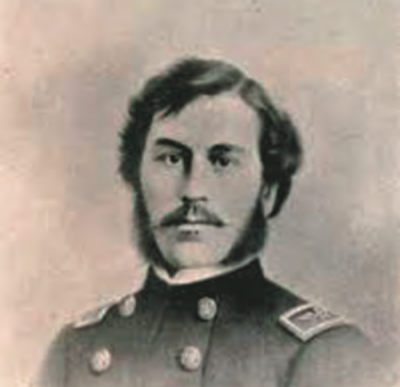
Colonel Haldimand Sumner Putnam Commander 7th New Hampshire Volunteer Regiment. Photo credit: Monroe County Library.
June 7th p.m. it is extremely hot there are 8 teamsters of this Regiment going to Key West at work on a railroad. They will have a hot job. I think we shall escape the drill today as it is so hot & the inspector leaves at six. There were five companies drilled this a.m. & we come next. A boats crew from Company E went to Loggerhead last night & got 4 Turtles. One of them the largest seen for a long time it weighed 375-lbs. The gunboat Wanderer left here about a week ago suddenly. We thought there was something in the wind. She sailed round west of Loggerhead & arrived just in time to see a steamer capture a schooner loaded with cotton bound for Havana that had run the blockade. Such is the report. The Wanderer arrived here last night & left this morning. She makes a business of cruising in the Gulf for such vessels as run the blockade. I wish I knew how many shells you could use & give away profitably. If I stay here long I could send a peck if it was necessary & would pay. I want you to burn one sheet of the letter I sent you about a fortnight ago. I have not had a spell since half so bad, in fact not to touch it, but if I live to get home remember what I wrote & be prepared for I shall be in great distress & it takes powerful remedies for great diseases.
Good Bye My Dear Girl. I return the wish that God will bless you all
& keep you happy and contented, C Shedd.
Fort Jefferson June 14th, 1862.
Dear Wife,
I had the happiness of reading this morning yours of May 15th & June 1st, also one for Mr. McConnell. He wrote the first particulars of Enfield politics that I have heard & I am greatly obliged to him & will write him as soon as I get time, which, before I get through, you will see is pretty well occupied. Our inspector I wrote you about has gone to seed; we were reported to be in first rate condition in regard to clothing & equipment. The mail came in this morning before I came off guard & I am very sleepy. Now for the news we received: the steamer Ericsson is ordered here to proceed to Key West & take on 2 or 3 companies of regulars there, then to proceed to Hilton Head, S. C. Hurrah bully for that although we are going right away from home as far as comfort is concerned: although there is but precious little of it here we shall see service now, I think in the state I have always wanted to be in as all true Mass Men have a particular grudge against the devils there. Oh! If we only had good officers I should be much better satisfied for in a fight we are liable to be murdered by their incapacity. I expect it will be a long time before I hear from you again if ever. Life is very uncertain here at the best; strong men are taken sick & in two or three days are put in the sand. Someone dies most every day. They die in the forenoon & are buried in the afternoon in a pine coffin just planed enough to take the slivers off. Then they wind the Stars & Stripes around them and put them in a boat, fire a volley & tote them over to Bird Key bury them about two feet deep in the sand & we forget them as soon as they are out of sight. The Army is the death of all human feelings I feel that the chances are that I may never see N.H. again but I am not going to worry about it. I most earnestly hope that you will not all is if I should not remember that my first & last love were centered in you & our children; that covers the whole ground except a remembrance of all my friends. There is no regular mail leaves here till we leave but the captain of the steamer that brought the mail this morning will take letters to Key West in season for the mail that leaves for N. Y. tomorrow. If you receive this I think you had better direct to Hilton Head S.C. or perhaps if we should go elsewhere you may get notice of it in the papers before I can write again. We shall be 5 or 6 hundred miles nearer home than here. I have contracted no very pleasant associations here & consequently can leave with a light heart: whether we get better or worse treatment we shall have change of scenes which will go far to make men think lightly of the hardships we may be obliged to bear. I have all my courage left & I hope you will never have cause to blush for me when the time of trial comes. Live or Die I hope you & our children will in thinking of me, feel proud in the knowledge that I have done my duty. We expect to go Tuesday in the mean time we have to load all of our camp equipage & provisions which will be quite a job. We shall have to leave many things here which we cannot carry. I am disappointed in not being able to send the shells I have gathered I don’t know what I shall do with them. Well it is no use of thinking of carrying them as I have got to through away some of my clothing for I cannot get it all into my knapsack.
Adieu Dear Ones; I cannot stop to write more today,
C. Shedd.
This is Calvin Shedd’s last letter from Fort Jefferson.
Society News by Tom Hambright
Anyone that studies history will tell you that sometime you cannot find the rest of the story. Our front page article is such a story, but there is a enough information for a look at the drug trade in 1921.
I have searched for years for the membership of The Grand Army of The Republic in Key West. The Grand Army was a fraternal organization composed of veterans of American Civil War for the Northern/Federal forces. Founded in 1866 in Decatur, Illinois, and growing to include hundreds of posts (local community units) across the nation, (predominately in the North, but also a few in the South and West), it was dissolved in 1956 when its last member, Albert Woolson (1847-1956) of Duluth, Minnesota, died. Linking men through their experience of the war. The G.A.R. promoted voting rights for then called “Negro”/”Colored” black veterans, as many white veterans recognized their demonstrated patriotism and sacrifices, providing one of the first racially integrated social/fraternal organizations in America.
Key West remained in the Union during the Civil War and after the war local veterans formed a unit of the G.A.R. post named Major B.C. Lincoln Post No. 13, which in the late 1800s may have been one of the few integrated organization in the state. The G.A.R. is listed in the city directories with the officers. The listing in Maloney’s 1900 Directory showed Dr. J.W.V.R. Plummer, PC; Frank Shavers, S V C; Henry Colson, J V C; James A. Roberts, adjt.
After years of searching for more information on the local unit of the G.A.R. without success when I found the above partial article in the Scott De Wolf Collection which list some of the original members of the Major B.C. Lincoln post being installed by Frank N. Wicker, who was Collector of Custom from 1873 to 1883. Several more searches of the De Wolf Collection has failed to find the missing piece, so far no luck.
The members of the G.A.R. in the artical are: William H. Wood, John Williams, D.B. Mathews, Moses Thomas, John Scheurer, George H. Wood, Tony Laurie, Henry Linter, Thomas Ponshot, Charles Williams, John Fletcher, Stepney Austin, Clark Yarwood and Moses Crawford.
New Members
Peter Admas, Glenwood, MD; Mr. & Mrs. T.M. Arrasmith, Washington, DC; Max Foster, Riverview, FL; Herb Martin, Longwood, FL; James Story, Dividson, NC; Alan Teitelan, Key West; Richard Vaughan, Kansas City, MO; Alvin Whitaker, Waterloo, WI.
EDUCATION PROGRAM SPONSORS
$100 OR MORE
LINDA & LAWRENCE ABELE
TOM & KITTY CLEMENTS
PRUDENCE CHURCHILL & LAWRENCE PLUMMER BETTY L. DESBIENS
BUD DRETTMANN
JOHN & BEATRICE DUKE
SHIRLEY FREEMAN & HARVEY SERVER CELESTE ERICKSON
DR. ELIAS GERTH
MARY HAFFENREFFER
TOM & LYNDA HAMBRIGHT HARRIGAN FOUNDATIONS, INC.
JOHN H. JONES
LAURA LYNNE KENNEDY
EDWARD B. KNIGHT
TOM KNOWLES
TOM & BARBARA MARMION
DR. WILLIAM R. PLOSS
LARRY & GRETCHEN RACHLIN
JUAN L. RIERA
JUDITH & JAMES ROBERTS SOUTHERNMOST HOTEL IN THE USA
ED SWIFT
KIMBERLY & GARY WALWER
ROBERT J. WOLZ
BUSINESS MEMBERS
ALLEN COUNTY PUBLIC LIBRARY GENEALOGY CENTER
900 LIBRARY PLAZA
FORT WAYNE, IN 46802 260-421-1223
COASTAL SAILING ADVENTURE, INC. 28555 JOLLY ROGER DRIVE
LITTLE TORCH KEY, FL 33042-0839 295-8844
CONCH TOUR TRAINS, INC. 601 DUVAL ST.
KEY WEST, FL 33040 294-4142
DR. FRED COVAN
1901 FOGARTY AVE. SUITE 2 KEY WEST, FL 33040 305-294-7522
DEWOLF AND WOOD ANTIQUARIANS ON THE GREEN P.O. BOX 425
ALFRED, MAINE 04002 207-490-5572
FRIENDS OF ISLAMORADA AREA STATE PARKS P.O. BOX 236
ISLAMORADA, FL 33036
DR. ELIAS GERTH
2505 FLAGLER AVE.
KEY WEST, FL 33040 305-295-6790
HISTORIC FLORIDA KEYS FOUNDATION 510 GREENE STREET
KEY WEST, FL 33040
HISTORICAL PRESERVATION SOCIETY OF THE UPPER KEYS, INC. P.O. BOX 2200
KEY LARGO, FL 33037
KEY WEST ENGINE SERVICE, INC. P.O. BOX 2521
KEY WEST, FL 33045
KEY WEST TENNIS
1305 REYNOLDS STREET KEY WEST , FL 33040 561-445-7805
KEY WEST WOOD WORKS
6810 FRONT STREET STOCK ISLAND KEY WEST, FL 33040 296-1811
MEL FISHER MARITIME HERITAGE SOCIETY 200 GREENE ST.
KEY WEST, FL 33040 294-2633
OLD TOWN TROLLEY 6631 MALONEY AVENUE KEY WEST, FL 33040 296-6688
PIGEON KEY FOUNDATION P.O. BOX 500130 MARATHON, FL 33050
RIERA TOURS
P.O. BOX 522026 MIAMI, FL 33152 305-446-2712 JUANR377@GMAIL.COM
A.R. SAVAGE & SONS, INC. 701 HARBOUR POST DRIVE TAMPA, FL 33602 813-247-4550
SEASTORY PRESS
305 WHITEHEAD STREET #1 KEY WEST, FL 33040 296-5762 SHERI@SEASTORYPRESS.COM
SOUTHERNMOST HOTEL IN THE USA 1319 DUVAL STREET
KEY WEST, FL 33040 296-6577
ST. LOUIS AUTOMATIC SPRINKLER CO. 3928 CLAYTON AVE.
ST. LOUIS, MO 63110 314-533-7710
DONALD E. YATES, P.A. LAW OFFICE 611 EATON STREET KEY WEST, FL 33040. 305-296-2261
